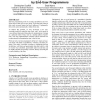Free Online Productivity Tools
i2Speak
i2Symbol
i2OCR
iTex2Img
iWeb2Print
iWeb2Shot
i2Type
iPdf2Split
iPdf2Merge
i2Bopomofo
i2Arabic
i2Style
i2Image
i2PDF
iLatex2Rtf
Sci2ools
ICSE
2008
IEEE-ACM
2008
IEEE-ACM
Tool support for data validation by end-user programmers
End-user programming tools for creating spreadsheets and webforms offer no data types except "string" for storing many kinds of data, such as person names and street addresses. Consequently, these tools cannot automatically validate these data. To address this problem, we have developed a new userextensible model for string-like data. Each "tope" in this model is efined abstraction that guides the interpretation of strings as a particular kind of data, such as a mailing address. Specifically, each tope implementation contains software functions for recognizing and reformatting that tope's kind of data. With our tools, end-user programmers define new topes and associate them with fields in spreadsheets, webforms, and other programs. This makes it possible at runtime to distinguish between invalid data, valid data, and questionable data that could be valid or invalid. Once identified, questionable and/or invalid data can be double-checked and possibly corrected,...
Related Content
| Added | 17 Nov 2009 |
| Updated | 09 Dec 2009 |
| Type | Conference |
| Year | 2008 |
| Where | ICSE |
| Authors | Christopher Scaffidi, Brad A. Myers, Mary Shaw |
Comments (0)

